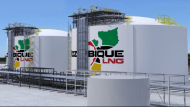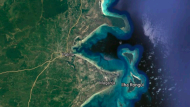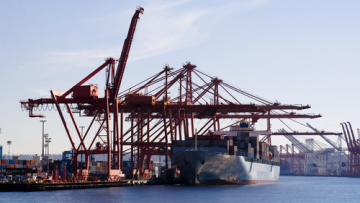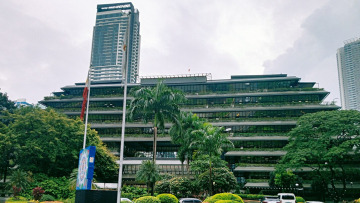AGM Report: Standard Chartered called out for bankrolling dangerous fossil fuel projects
Rieke Butijn,
Climate campaigner and researcher,
BankTrack,
henrieke@banktrack.org

Rieke Butijn,
Climate campaigner and researcher,
BankTrack,
henrieke@banktrack.org
Yesterday in London, campaigners from BankTrack, Urgewald, Center for Energy, Ecology, and Development (CEED), ShareAction and Reclaim Finance joined the annual shareholder meeting of the UK’s Standard Chartered to expose the bank’s harmful deals and lack of climate ambition. Among the campaigners was CEED’s Avril de Torres from the Philippines, who challenged the bank on its financing for San Miguel Global Power, a Filipino fossil fuel company threatening marine life in the Verde Island Passage (VIP) – a global biodiversity hotspot crucial to the local communities’ livelihoods.
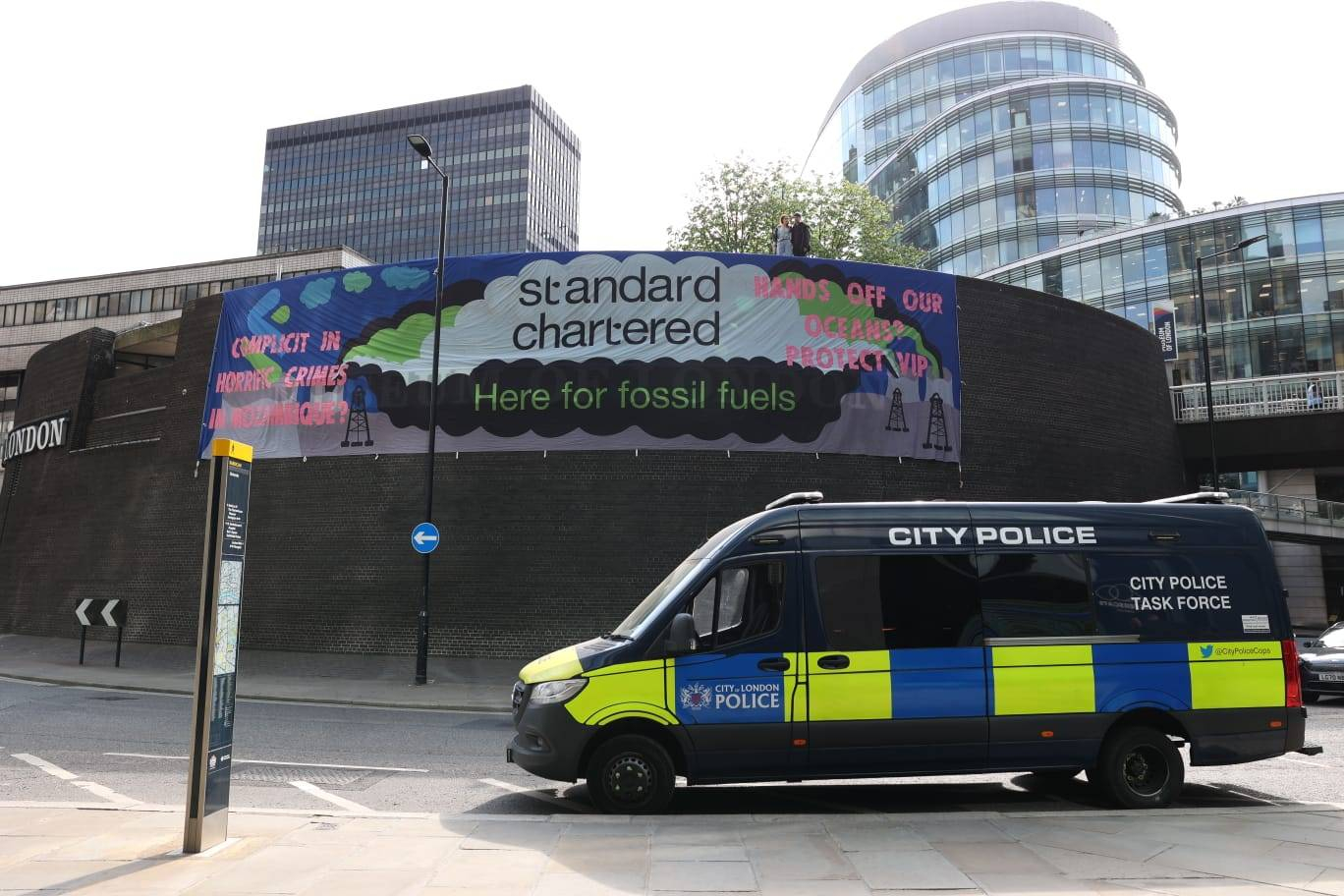
Before the start of the meeting, members of Money Rebellion unveiled a banner right in front of the venue entrance that read: “Standard Chartered. Here for fossil fuels”; “Complicit in horrific crimes in Mozambique?”; and “Hands off our oceans. ProtectVIP”.
Allegations of severe human rights violations in Mozambique
Standard Chartered finances fossil fuel expansion projects and companies wreaking havoc in communities around the world. One of these projects is the Mozambique LNG project in Mozambique’s conflict-torn northern province of Cabo Delgado. Standard Chartered, along with other banks, signed a loan agreement to finance this project, a carbon bomb, in 2020. Not even six months later, in March 2021, the project’s main shareholder and operator, TotalEnergies, declared force majeure after a violent insurgent attack on Palma Town, close to the project site.
BankTrack’s Henrieke Butijn had already challenged the bank on this project during last year’s AGM, pointing to its severe impacts, which range from worsening the violent conflict, displacing communities with delayed or inadequate compensation, and threatening natural marine and coastal ecosystems, and calling on the bank to pull out of the project.
One year later, news reports link the project to even more horrific human rights abuses. According to an article in Politico published in September 2024, a special Joint Task Force (JTF) of Mozambican troops assaulted hundreds of civilians who were seeking safety, and imprisoned the men in windowless, metal shipping containers near the entrance of the Mozambique LNG site. The Joint Task Force (JTF) was set up to “ensure the security of Mozambique LNG project activities in Afungi site” and TotalEnergies was directly providing food, equipment, accommodation and individual bonuses to the soldiers. The article reports that men – 180 to 250 individuals – were detained for three months, denied water, starved, beaten, suffocated, tortured, stabbed and, finally, most of them “disappeared”. Only 26 of the prisoners are estimated by the investigation team to have survived. Women were subjected to humiliation and repeated sexual assault before being released. In addition, in November 2024, Le Monde and SourceMaterial reported that TotalEnergies was aware that JTF troops were “accused of raping, abducting and killing civilians”.
After setting out these new revelations, Henrieke Butijn asked the bank whether it finds these alleged human rights violations and the potential links with TotalEnergies’ concerning, whether the bank supports civil society’s call for an independent investigation done by an independent international body such as the OHCHR, and if Standard Chartered thinks that the current circumstances allow for it to continue financing Mozambique LNG.
Members from Money Rebellion chimed in to ask the bank whether it was aware that UK's export credit agency UKEF is currently taking legal advice over pulling out of the project, whether the bank will do the same, and whether the bank is aware of the fact that an official UK inquest is underway into the death of a UK citizen during the Palma attack in 2021.
To all questions, the bank answered that it takes its responsibility very seriously but, like last year, it refused to answer directly, provided evasive answers and hid behind “client confidentiality”.
In addition to questioning the board in person, BankTrack also sent in questions in writing regarding the cumulative and under researched environmental and biodiversity impacts of the four gas projects in Cabo Delgado, the Rovuma LNG project, whose final investment decision has also been delayed due to the ongoing violence and shares land use rights and some infrastructure with the Mozambique LNG project, and the Coral North FLNG project. All of the questions we sent in can be found here. We look forward to receiving these answers at a later date.
Community impacts in the Philippines
For the third year in a row, Standard Chartered was also called out on its financing of San Miguel Global Power in the Philippines. San Miguel is one of the driving forces of LNG and gas expansion projects in the Verde Island Passage, a sea strait dubbed the “Amazon of the oceans” due to its significance in marine biodiversity. CEED’s Avril de Torres read out a statement and questions from Bishop Gerardo Alminaza, a Catholic Bishop and Vice President of Caritas Philippines, representing the Protect Verde Island Passage network. Bishop Gerry called on the board to consider “our collective duty to protect the environment and care for our Common Home”, reminded the bank about the impacts of these expansion projects on fisherfolk communities and marine life, and that engagement with the bank has not translated into any substantial changes in the bank’s activities in the Philippines. The Bishop wanted to know from the bank whether it thinks it’s ethical and moral to continue its finance for San Miguel despite repeated warning signs and whether the board and CEO agree to meet with the Protect VIP network and affected communities.
Standard Chartered, however, only gave more or less the same answer as when asked about Mozambique LNG, saying the bank takes its responsibility seriously, referring to its position statements, and claiming it has strong governance structures. The Chair Jose Viñals added that he realised he is giving similar answers and argued that this is because we ask similar questions.
Still financing coal expansion despite net-zero commitment
Although Standard Chartered has committed to work towards net-zero financed emissions by 2050, the bank continues to finance coal expansion companies such as India’s Adani Group and Indonesia’s coal-dominated power utility PLN.
Despite mounting evidence of Adani’s illicit business conduct and market manipulation, including funnelling the finance raised for its green energy projects to its coal business, Standard Chartered has repeatedly acted as bookrunner for Adani Green’s bonds. This includes the last two rounds of bonds issued in 2024, which were soon withdrawn in the wake of investor distrust in the group and Gautam Adani’s indictment in the US.
Standard Chartered has also underwritten bonds for PLN. PLN currently operates 135 coal-fired power plants in Indonesia, with plans to expand coal power in the country up until 2030 by installing 13.8 GW of new coal power capacity, and relying on the false solution of biomass co-firing. PLN’s coal operations are reportedly causing severe public health issues, as higher rates of respiratory diseases (such as asthma, bronchitis and tuberculosis) have been recorded in the communities living close to PLN’s plants, particularly among children.
Standard Chartered’s commitment, effective next year, to no longer finance Utilities sector clients that are over 60% reliant on coal would still allow the bank to finance companies like Adani and PLN. BankTrack sent in a question in writing to ask the bank when it will close these loopholes, and looks forward to receiving a written answer.
No targets on renewables for emerging markets and developing economies
Also at the AGM, Kelly Shields from ShareAction read out a statement backed by 21 investors representing over USD 1 trillion in assets under management, calling on Standard Chartered to outline a strategy and target for financing more renewable power in emerging markets and developing economies (EMDEs). Standard Chartered answered that the bank agrees with ShareAction’s goal of supporting EMDEs in achieving net zero through a just transition but said that its strategy does not include specific renewable energy financing targets, due to market volatility and the need for flexibility (for example, to be able to fund coal plant retirements, which are not considered renewable financing but according to the bank are still crucial to the energy transition). ShareAction expressed that it is disappointed that Standard Chartered isn’t currently planning on setting a target for a sector so critical to the energy transition at this time but that they will be engaging further with the bank and this coalition of investors on the topic.
What’s next?
Considering Standard Chartered's inadequate responses, BankTrack and partners will keep holding the UK banking giant to account over its climate and human rights record. The bank can expect further actions in the year ahead, as well as continued pressure from the frontline groups and communities most affected by its fossil fuel finance to engage more substantively. We will be campaigning alongside them and other partners for the bank to immediately stop financing fossil fuel expansion, ramp up renewable energy financing, especially in EMDEs, and significantly improve its human rights due diligence processes, policies and grievance mechanisms for affected communities.

